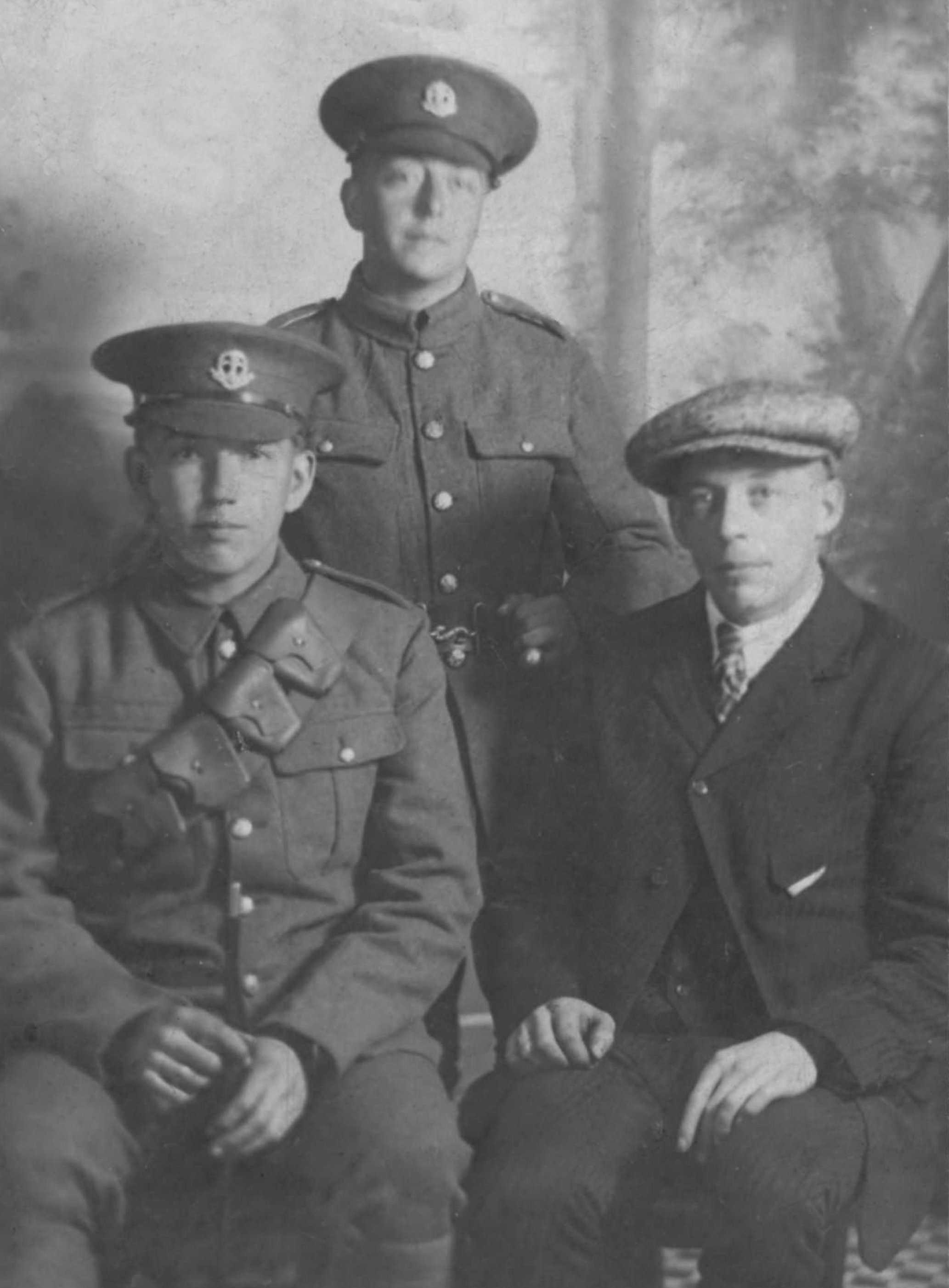Pte
Ernest Tatt
Information about birth
|
Date of birth: 29/05/1896 |
|
Place of birth: St John's Wood, Middlesex, England, United Kingdom |
General information
|
Last known residence: 58 St Mark's Road, Enfield, Middlesex, England, United Kingdom |
|
Profession: Clerk civil engineering office |
|
Religion: Church of England |
Army information
|
Country: England, United Kingdom |
|
Force: British Expeditionary Force |
|
Rank: Private |
|
Service number: 28900 |
|
Units: — The Duke of Cambridge’s Own (Middlesex Regiment), 1st Bn. (Last known unit) |
Information about death
|
Date of death: 01/01/1976 |
|
Place of death: Hackney, Middlesex, England, United Kingdom |
|
Cause of death: Death post-war (unrelated) |
|
Age: 79 |
Distinctions and medals 2
|
British War Medal Medal |
|
Victory Medal Medal |
Points of interest 5
| #1 | Place of birth | ||
| #2 | Last known residence | ||
| #3 | Prisoner of War (POW) | ||
| #4 | Prisoner-of-war camp | ||
| #5 | Place of death (approximate) |
My story
Ernest Tatt was born in St John's Wood, Middlesex. He was the son of James William and Esther Tatt (née Heitt). Ernest had two brothers: Alfred and Albert. During the war, he was assigned to The Duke of Cambridge's Own (Middlesex Regiment), 1st Battalion, 98th Brigade, 33rd Division.
The division was involved in the Battle of Passchendaele (31 July - 10 November 1917). On the night of 24-25 September, the 1st Middlesex took up positions between Polygon Wood and the Reutelbeek; "A" Company was on the right of the front line at Carlisle Farm, "B" Company on the left. "C" and "D" Comapnies were in the second line. In the early morning of 25 September 1917, German troops of the 16. Kgl. Bayer. Infantry Division launched a counterattack on the lines of the 33rd Division. The forward companies of the 1st Middlesex took the brunt of it. Under cover of an artillery barrage, the Germans managed to create a breach between "A" and "B" companies. "A" Company's positions were cut off and overrun. After hand-to-hand fighting, the remnants of the companies fell back on the second line. All officers of the two companies were killed or wounded, including Captain Preston, commanding officer of "A" Company. Although the second line was able to prevent a further advance, the 1st Middlesex had suffered heavy losses; 37 killed, 69 wounded and 131 missing. According to the War Diary of the 1st Middlesex, 12 men from "A" Company were also captured. One of them was 21-year-old Ernest Tatt. He was deported via Dendermonde to the prisoner-of-war camp at Dülmen near Münster. At its peak, about 10,000 POWs were housed here. The prisoners of war were employed in industry in the city of Dülmen and in agriculture. The camp was disbanded in 1918 and served as a repatriation camp for German soldiers from 1919.
Ernest returned home. In 1922, he married Dorothy Rose Partner. A year later, they had a daughter, Pearl Margaret Tatt. By 1939, the family was living at 58 St Mark's Road in Enfield. Ernest then worked as an office clerk in an engineering firm. In 1976, Ernest died peacefully at the age of 79.
The division was involved in the Battle of Passchendaele (31 July - 10 November 1917). On the night of 24-25 September, the 1st Middlesex took up positions between Polygon Wood and the Reutelbeek; "A" Company was on the right of the front line at Carlisle Farm, "B" Company on the left. "C" and "D" Comapnies were in the second line. In the early morning of 25 September 1917, German troops of the 16. Kgl. Bayer. Infantry Division launched a counterattack on the lines of the 33rd Division. The forward companies of the 1st Middlesex took the brunt of it. Under cover of an artillery barrage, the Germans managed to create a breach between "A" and "B" companies. "A" Company's positions were cut off and overrun. After hand-to-hand fighting, the remnants of the companies fell back on the second line. All officers of the two companies were killed or wounded, including Captain Preston, commanding officer of "A" Company. Although the second line was able to prevent a further advance, the 1st Middlesex had suffered heavy losses; 37 killed, 69 wounded and 131 missing. According to the War Diary of the 1st Middlesex, 12 men from "A" Company were also captured. One of them was 21-year-old Ernest Tatt. He was deported via Dendermonde to the prisoner-of-war camp at Dülmen near Münster. At its peak, about 10,000 POWs were housed here. The prisoners of war were employed in industry in the city of Dülmen and in agriculture. The camp was disbanded in 1918 and served as a repatriation camp for German soldiers from 1919.
Ernest returned home. In 1922, he married Dorothy Rose Partner. A year later, they had a daughter, Pearl Margaret Tatt. By 1939, the family was living at 58 St Mark's Road in Enfield. Ernest then worked as an office clerk in an engineering firm. In 1976, Ernest died peacefully at the age of 79.
Sources 5
|
1 Battalion Middlesex Regiment, (The National Archives, KEW (TNA), WO 95/2426/1). https://www.nationalarchives.gov.uk/ Sources used |
|
1939 England and Wales Register (the National Archives, Kew (TNA) Rg 101/745j). https://www.nationalarchives.gov.uk/ Sources used |
|
Census Returns of England and Wales 1911 (The National Archives, Kew (TNA) RG14). https://www.nationalarchives.gov.uk/ Sources used |
|
McCarthy Chris, Passchendaele. The Day-by-Day Account (London, Unicorn Publishing Group, 2018) 89-90. Sources used |
|
Prisoners of the First World War, the ICRC archives (International Committee of the Red Cross archives, Geneva (ICRC), ACICR, C G1). https://grandeguerre.icrc.org/ Sources used |
More information 1
|
Lives of the First World War (Imperial War Museum) https://livesofthefirstworldwar.iwm.org.uk/lifestory/4359874 |
